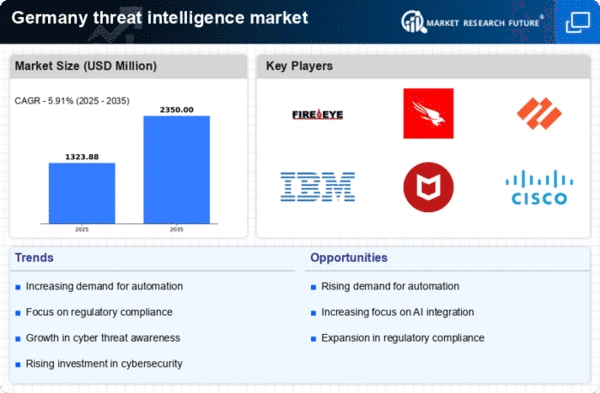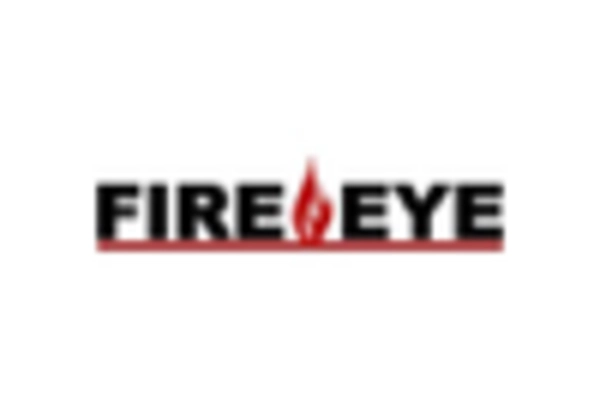Rising Cyber Threats
The escalating frequency and sophistication of cyber threats in Germany are driving the demand for the threat intelligence market. With incidents such as data breaches and ransomware attacks becoming more prevalent, organizations are compelled to invest in advanced threat intelligence solutions. In 2025, it is estimated that cybercrime will cost the global economy over $10 trillion annually, with Germany being a significant contributor to this figure. As businesses recognize the potential financial and reputational damage from cyber incidents, the threat intelligence market is expected to grow substantially, with a projected CAGR of 12% through 2027. This trend underscores the necessity for proactive measures in cybersecurity, making threat intelligence an essential component of organizational defense strategies.
Regulatory Compliance Requirements
Germany's stringent regulatory landscape, particularly with the General Data Protection Regulation (GDPR), necessitates robust cybersecurity measures. Organizations are increasingly required to implement comprehensive threat intelligence solutions to ensure compliance with these regulations. Non-compliance can result in hefty fines, reaching up to €20 million or 4% of annual global turnover, whichever is higher. This regulatory pressure is propelling the threat intelligence market, as companies seek to mitigate risks associated with data breaches and ensure adherence to legal standards. The demand for threat intelligence services is likely to rise as businesses prioritize compliance, thereby enhancing their overall security posture and reducing potential liabilities.
Growing Awareness of Cybersecurity Risks
There is a notable increase in awareness regarding cybersecurity risks among organizations in Germany. This heightened consciousness is largely attributed to high-profile cyber incidents that have made headlines, prompting businesses to reassess their security strategies. As a result, the threat intelligence market is experiencing a surge in demand, with organizations seeking to leverage intelligence solutions to better understand and mitigate risks. In 2025, it is projected that the market will reach approximately €1.5 billion, reflecting a growing recognition of the importance of threat intelligence in safeguarding sensitive information. This trend indicates a shift towards a more proactive approach to cybersecurity, where organizations prioritize threat intelligence as a critical element of their defense mechanisms.
Technological Advancements in Cybersecurity
The rapid evolution of technology is significantly influencing the threat intelligence market in Germany. Innovations such as artificial intelligence (AI) and machine learning (ML) are being integrated into threat intelligence solutions, enhancing their effectiveness in identifying and responding to threats. These advancements allow for real-time analysis and improved predictive capabilities, which are crucial in a landscape where cyber threats are constantly evolving. As organizations seek to adopt cutting-edge technologies to bolster their cybersecurity frameworks, the threat intelligence market is likely to expand. By 2026, the market is expected to grow by approximately 15%, driven by the demand for sophisticated solutions that can adapt to emerging threats.
Increased Investment in Cybersecurity Infrastructure
Organizations in Germany are significantly increasing their investments in cybersecurity infrastructure, which is a key driver for the threat intelligence market. As businesses recognize the critical need for robust security measures, funding for threat intelligence solutions is on the rise. In 2025, it is estimated that spending on cybersecurity in Germany will exceed €10 billion, with a substantial portion allocated to threat intelligence services. This investment trend reflects a broader commitment to enhancing security postures and protecting sensitive data from cyber threats. The growing allocation of resources towards threat intelligence indicates a proactive stance among organizations, aiming to stay ahead of potential cyber risks and ensure business continuity.
















